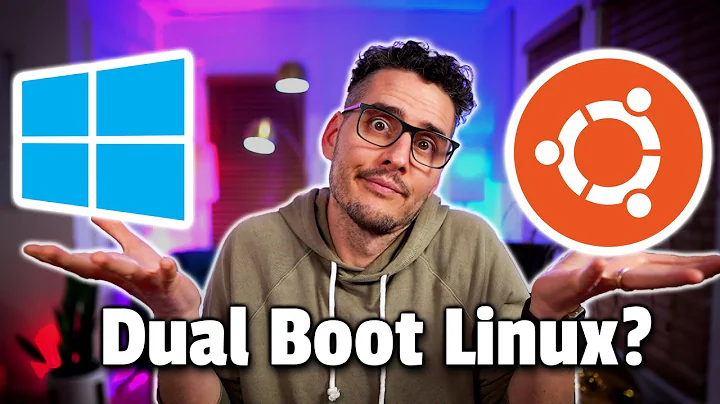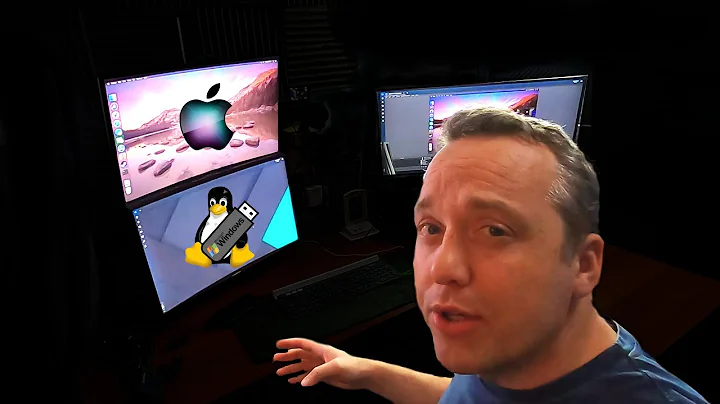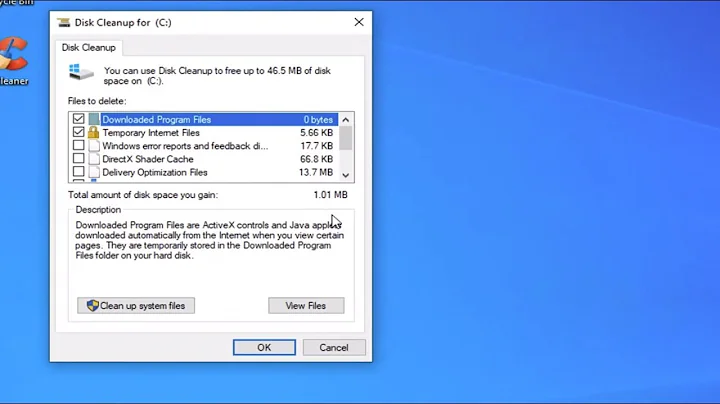Run both at the same time, Windows and Ubuntu
Solution 1
The short answer is, yes you can run both Windows and Ubuntu at the same time.
The long answer of "how can I do it?" depends on what you want your host OS and what you want your "guest OS" to be. I can think of three possibilities:
First, use Windows as the host. This means Windows will be your primary OS running directly on the hardware (the computer). This is how most people run Windows. Then you will install a program in Windows, such as Virtualbox, or VMPlayer (call it VM). When you launch this program you will be able to install another OS, say Ubuntu, inside the VM as a guest. Before you install Ubuntu in the VM, you will need to assign some resources to the VM such as the amount of RAM and hard-disk space. The VM program will act like a virtual computer with the RAM and hard-disk space you have allocated. Once installed, you will be able to run Ubuntu within the VM, either in a window or in full screen mode.
Second, You can also do the reverse. That is, install Ubuntu as the host on a real machine and install Windows as a guest in a VM inside Ubuntu.
Third, If you have a Mac as a host, you can use a similar VM program called Parallel for Mac and create two VMs, one for Windows, and another for Ubuntu.
See the VM Wiki for additional details.
Also see the Ubuntu Help on Virtual Box, VMWare/Player and Parallel VM for Mac.
Drawbacks
The main drawback of running an OS in a VM is access to resources, say RAM. First, the host will need some RAM to run itself and any native programs like a word processor you want to run. The guest can then only use what is left behind. So if you have only 4GB of RAM and Windows (the host) needs 3GB to work well. The Ubuntu as guest can only use 1GB of physical RAM. You may assign more RAM to Ubuntu, but things will slow down as the hard drive will be used as virtual RAM and things will be moved between real RAM and the virtual RAM.
The second drawback is also related to resources. Say you have a very fancy graphics card in your machine. However, in the VM all the hardware is virtual. The default virtual graphics card may have more limited capabilities, but may be chosen as default as it is compatible to a variety of OSs. So the OS in the VM won't be able to take advantage of the fancy graphics card. The difference between the first and the second drawback is the following. You can get more RAM or a bigger hard-drive in the real machine, and then allocate them to the VM. There may not be an easy way to change the default configurations of other aspects of the virtual hardware in the VM. Thus, a faster graphics card in the real machine may not translate to one in the VM.
On virtual terminal:
I don't know what you mean by it. To me, a virtual terminal is a command line interface that can work without the graphical user interfaces (GUI) in Ubuntu and other Linux and similar systems. The concept of a virtual terminal does not apply to Windows. See What is a virtual terminal for? for more details on virtual terminals.
Hope this helps.
Solution 2
Most all operating systems expect to have full uninterrupted access to the computer's hardware/resources, and do not like sharing with another OS, it won't work. So the answer to that is virtualization.
Virtual Machines that use technologies like Intel's VT-x and AMD's AMD-V aloow you to do just that.
Virtual Box, and VMWare allow you to install multiple operating systems on the same host machine. Such as Windows, Linux, and Mac OS. Both allow you to:
- Run more than one OS at a time
- Switch between the OS's as you like
- Start, stop, and pause the OS's at the same time or independent of each other
- Sharing between the OS's
- The ability to allocate the desired resources
- Backup and restore using a snapshot
Using this way requires you to have great hardware, a lot of RAM, and disk space, otherwise you will feel a lag. Depending on how many operating systems you're planning on running. Just to give you an example, I have a 3.0 GHz i7 CPU with 16GB RAM, and 2 TB Hard Disk. I run Ubuntu 12.04 as the host OS, and I have the following Virtual Machines running at the same time: Ubuntu 12.10, Ubuntu Server 12.10, Redhat 6, Window 7, and Windows 8 ( windows 7 & 8 for work, and testing purposes).
Virtual Box does not require CPU-based virtualization support (VT-x or AMD-V), and you can download it free, while VMWare Workstations a paid application. I personally prefer VMWare Workstation.
For more information click here for VMWare, and VirtualBox
The image below is from my laptop running Windows 7 as the host with 4 VM's. Laptop is Dell w/ AMD A8, 8GB RAM.

Solution 3
As the other said you can use virtual machines. there is a fantastic option that would inspire you and is very useful You can use "seemless" option by pressing ctrl+L in virtualbox to to have a mixed ubuntu + windows environment that make you able to use windows and ubuntu without switching between two of them
Related videos on Youtube
Rodrigo Martins de Oliveira
Hand drawings lover, fan of scifi space movies, opensource contributor and Software Engineering Manager @ QuintoAndar
Updated on September 18, 2022Comments
-
 Rodrigo Martins de Oliveira over 1 year
Rodrigo Martins de Oliveira over 1 yearI had read in some sites that it is possible to run two OS'es in the same machine at the same time through a Virtual Machine software, so you can switch Virtual Terminals with keyboard hotkeys and be on Ubuntu browsing the web and switch to Windows to write a document, no need to restart and choose the other OS, both running simultaneously.
So first thing: Is it true?
If it is indeed possible how can I do that?
And what are the drawbacks?
Sorry if I misunderstood something about Virtual Terminals, although I don't know a lot about them and how they work or even for what purpose they exist.
OBS.: I noticed that my motherboard offers Intel Virtualization Technology, that says that this feature makes use of a hardware design that makes better virtualization (or helps, don't know) than software virtualization.
-
Web-E about 11 yearsanything different than virtualbox / vmplayer or you are talking about this kind of software?
-
 Rodrigo Martins de Oliveira about 11 yearsIn really I don't know, I read that it is possible to be running Ubuntu on you pc and then press a keyboard combo that will put Windows in your monitor, and you can be toggling OS'es. I have never used virtualbox, but I think that virtual box puts Windows in a window not? But it can be, I don't know a lot about virtualization.
Rodrigo Martins de Oliveira about 11 yearsIn really I don't know, I read that it is possible to be running Ubuntu on you pc and then press a keyboard combo that will put Windows in your monitor, and you can be toggling OS'es. I have never used virtualbox, but I think that virtual box puts Windows in a window not? But it can be, I don't know a lot about virtualization. -
Thomas Ward about 11 yearsVirtualBox will allow you to run another OS while running your primary OS. It will run in another window, but it's not like actually running Windows, because the hardware support is a lot more crappy.
-
ignis about 11 yearsIntel VT-X and AMD-V make virtualization faster. It's common in modern motherboards. No reason to be excited about that.
-
 Admin about 10 yearsIS it important to install ubuntu for running it on windows on virtualbox?
Admin about 10 yearsIS it important to install ubuntu for running it on windows on virtualbox? -
Witiko about 8 yearsIf you don't require full virtualization and would be happy with the ability to run (a) UNIX utilities from Windows or (b) Windows programs from Linux, then you should look into (a) Cygwin or (b) Wine.
-
-
 chaskes about 11 yearsVMplayer from VMWare is also free.
chaskes about 11 yearsVMplayer from VMWare is also free. -
 Rodrigo Martins de Oliveira about 11 yearsThanks Mitch your answer is very complete, I would like to accept both: your answer and user68186's answer, although it is not possible and I didn't select yours as the best because you didn't explained very well the drawbacks, although I appreciated very much your answer as well.
Rodrigo Martins de Oliveira about 11 yearsThanks Mitch your answer is very complete, I would like to accept both: your answer and user68186's answer, although it is not possible and I didn't select yours as the best because you didn't explained very well the drawbacks, although I appreciated very much your answer as well. -
 Rodrigo Martins de Oliveira about 11 yearsThanks user68186, you answered everything! In your opinion is it good for me to go on a Windows 8 (hardcore gaming/skype) host and Ubuntu 13.04 (everything) guest with my hardware: i5-3270 3.80GHz, (2x4) 8Gb RAM, 1Tb Sata 3 HDD, Radeon 7970 3Gb? Or Ubuntu host and Windows guest would let me play my hardcore games? Or it isn't good in any case, better to keep with the traditional dual boot?
Rodrigo Martins de Oliveira about 11 yearsThanks user68186, you answered everything! In your opinion is it good for me to go on a Windows 8 (hardcore gaming/skype) host and Ubuntu 13.04 (everything) guest with my hardware: i5-3270 3.80GHz, (2x4) 8Gb RAM, 1Tb Sata 3 HDD, Radeon 7970 3Gb? Or Ubuntu host and Windows guest would let me play my hardcore games? Or it isn't good in any case, better to keep with the traditional dual boot? -
user68186 about 11 yearsYou are welcome. If are into hard core games, Windows host with Ubuntu games makes more sense. You won't get the same performance in Windows games if you make Windows the guest. Give Ubuntu a try in the VM. If you like it, you can go to dual boot. You may want to ask this as a separate question for better answers.



![How to Dual Boot Ubuntu and Windows 10 [Works in 2021]](https://i.ytimg.com/vi/u5QyjHIYwTQ/hq720.jpg?sqp=-oaymwEcCNAFEJQDSFXyq4qpAw4IARUAAIhCGAFwAcABBg==&rs=AOn4CLCMQRIs_rLdZ1xQ2YONVdlCLxpcfw)
![How to Dual Boot Ubuntu 20.04 LTS and Windows 10 [ 2020 ]](https://i.ytimg.com/vi/-iSAyiicyQY/hq720.jpg?sqp=-oaymwEcCNAFEJQDSFXyq4qpAw4IARUAAIhCGAFwAcABBg==&rs=AOn4CLAWms41TxHCY0jR-E9STgMXQn9Lxw)